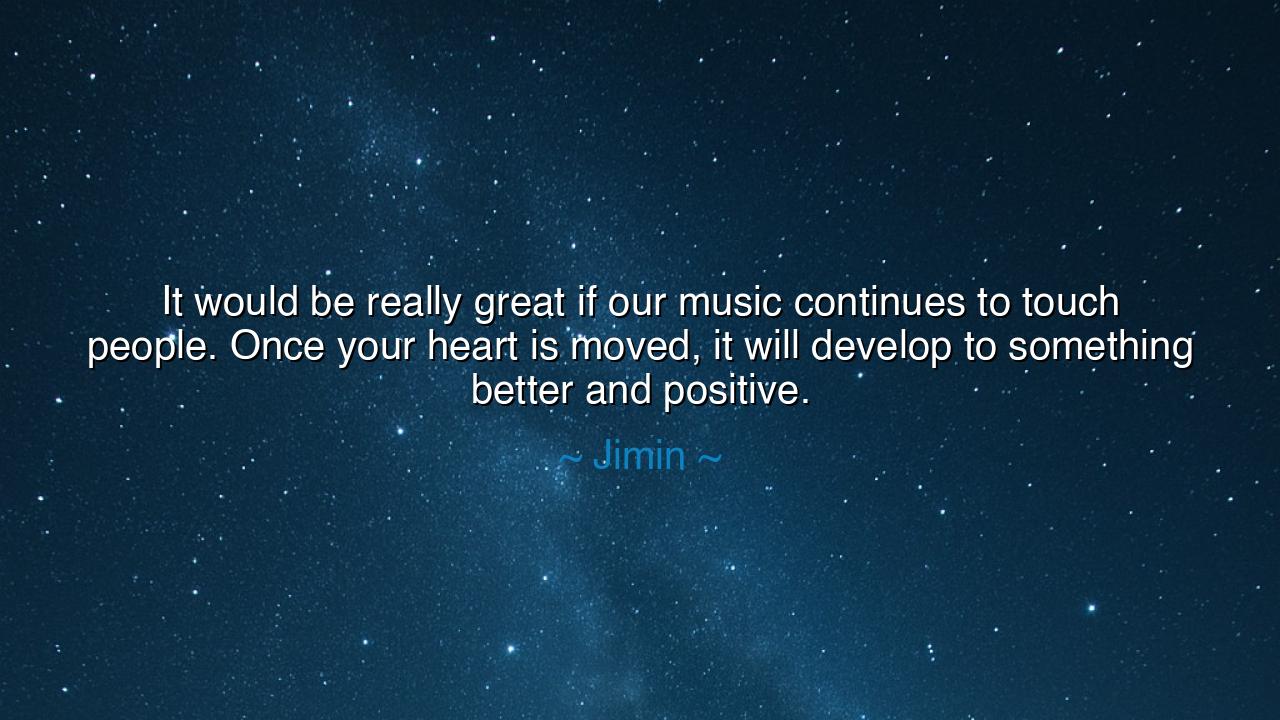
It would be really great if our music continues to touch people.
It would be really great if our music continues to touch people. Once your heart is moved, it will develop to something better and positive.






When Jimin declared, “It would be really great if our music continues to touch people. Once your heart is moved, it will develop to something better and positive,” he revealed a truth as ancient as song itself: that music is not merely for the ear, but for the heart, and once the heart has been stirred, the soul itself begins to transform. His words remind us that art has the power to plant seeds within us, seeds that grow into hope, strength, and light. To touch the heart is to awaken the possibility of change.
The ancients believed deeply in this principle. The philosopher Plato warned that the rhythms and modes of music shaped the character of entire nations. A melody of courage could rouse armies to victory; a song of harmony could bring peace to a divided people. What Jimin says is but a reflection of this timeless wisdom: that once the heart is moved, something stirs beyond the moment. It becomes growth, healing, and a turning toward the good.
Consider the story of Beethoven, who, though deaf and crushed by despair, poured his entire being into his symphonies. His music did not only entertain; it carried humanity’s cry for freedom, joy, and dignity. Generations who listened found themselves lifted, inspired to endure hardship with renewed courage. His work “touched” hearts long after his own heart ceased to beat, proving Jimin’s vision: that what begins as a stirring within can lead to something better and positive in the lives of countless others.
Jimin’s words also carry humility. He does not speak of fame, nor of recognition, but of the continuation of impact—that the true measure of art lies not in applause, but in whether it reaches into another’s inner life. To move someone’s heart is greater than selling out arenas; for the one who has been moved may carry that spark into the world, spreading kindness, strength, or healing where once there was only emptiness. Thus, music becomes not only performance, but service to humanity.
There is also hidden wisdom in the idea of development. He does not say the heart is changed instantly, but that once moved, it will develop—it will grow, evolve, unfold like a flower touched by the sun. A song may begin as a tear in the eye, but that tear may lead to forgiveness. A melody may awaken a smile, and that smile may lead to resilience. True art, then, is not only an emotional spark, but the first step in a chain of transformations that ripple outward.
The lesson for us is clear: seek out and create experiences that move the heart. Do not live only for shallow distraction, but for those moments that stir something deep within you. Cherish the song, the story, the painting, the words that awaken your soul, for they may guide you toward growth. And likewise, when you create—whether in art, in work, or in love—strive not only to impress, but to touch hearts. In doing so, you may set in motion a transformation far greater than you can see.
Practically, this means allowing yourself to be vulnerable to beauty. Listen to music with openness; let it move you rather than pass over you as noise. Share with others the works that stir you, for the spark that lifts you may also lift them. And when you labor in your own craft, remember Jimin’s wisdom: the goal is not perfection or applause, but impact—awakening what is best in another soul.
Thus, Jimin’s words resound like an ancient hymn: music that touches the heart has the power to transform sorrow into hope, and stillness into growth. It is not only sound, but seed; not only performance, but prophecy. And so the teaching is this: let us welcome the art that stirs us, and let us create with the hope of stirring others. For once the heart is moved, the world itself begins to move toward light.






AAdministratorAdministrator
Welcome, honored guests. Please leave a comment, we will respond soon